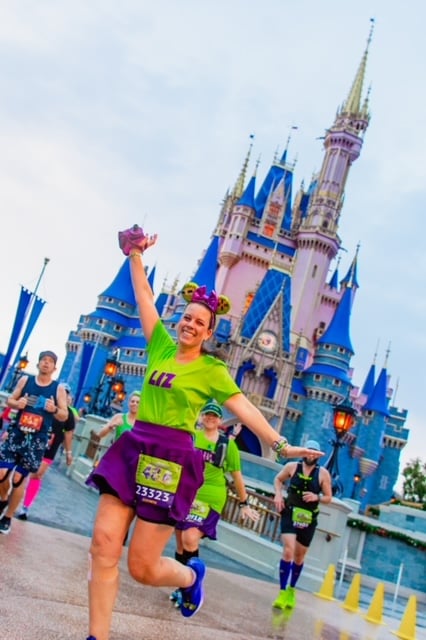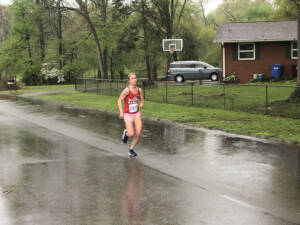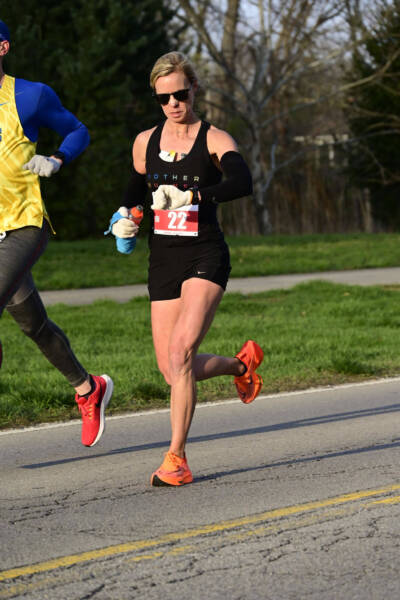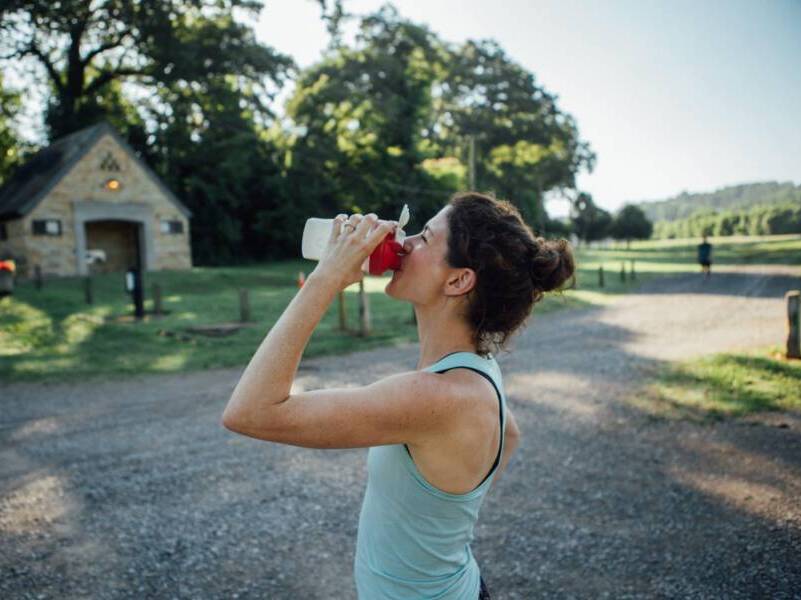How to Predict Your Marathon Time
Ahh, don’t we all wish we could have a crystal ball that was a marathon time predictor. But then, what fun would that be? Part of not knowing how we will perform in our marathon is part of what draws us. Yet, in the heart of my marathon training cycle, I find myself starting to obsess over trying to predict my marathon time and marathon race pace. (The athletes I coach do this, too.)
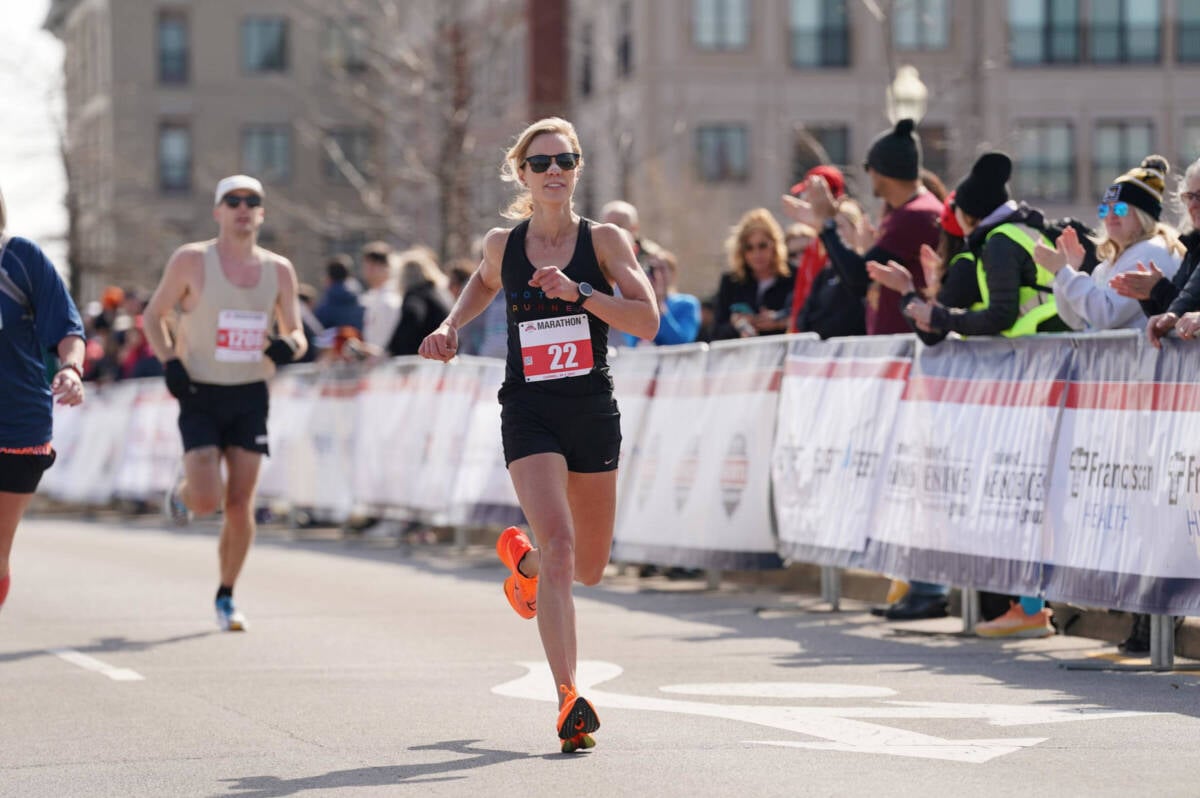
I remember in my marathon build in 2019 when I was trying to qualify for the Olympic Trials, I began to pester anyone who knew anything about my running what they thought—could I do it? Could I run a sub-2:45 marathon time? I repeatedly asked my husband, my running friends, and my running coach. I feel certain it was obnoxious and annoying. (Thank goodness they didn’t ditch me after this!)
The truth is while no crystal ball can predict marathon times, there are signs in your training that can help you determine what time it will take you to run a marathon.
Table of contents
- What are the best marathon time predictor calculators?
- How accurate is the VDOT calculator in predicting marathon times?
- Is the McMillan running calculator accurate?
- Is the Slate marathon time predictor accurate?
- Is the Runner’s World Race predictor calculator accurate?
- Is the Garmin Race Predictor accurate?
- How to Use Race Performances to Predict Marathon Times
- Using Easy Pace to Predict Marathon Finish Time
- Key Takeaways of How to Predict Your Marathon Performance
I got with esteemed running coach, Laura Norris, who knows a lot about marathon predictions and pacing from her experience and research studies. Norris has coached hundreds of athletes and errs on the side of caution. (Because those who overestimate their marathon finish times tend to go out too fast and blow up! It’s much better to underestimate and have a big kick in the last 10k)
Remember: All these marathon prediction strategies are a guide, they are not the rule.
Ok, let’s roll!
How can I predict my marathon race pace?
You can predict your marathon time by looking at your long-run pace and your workout paces. A lot of the below methods of determining your marathon time expect you to have a ballpark idea of where your marathon finish time may be.
If you have run workouts or races, you can plug these times into a race pace calculator or race estimator (see more below) to determine a ballpark of paces. If you have no idea what your paces will be, you can expect your long run pace to be close to your marathon race pace.
This strategy is most appropriate for those who are running their first marathon, wanting to complete the marathon with no time goal, and/or will run a marathon at or above 4 hours and 15 minutes (long run paces exceed 9:45 a mile).
You need to be honest with yourself with estimating your marathon time. Below are some workouts and strategies that can help you predictor your marathon race pace and marathon time.
How to Use Workouts to Predict Marathon Times
Workouts that simulate a marathon are best to predict your marathon time. These workouts include lactate threshold runs and marathon pace workouts. You can use the following marathon workouts to gain fitness and better estimate your ability.
What workouts help you predict your marathon time?
Threshold and marathon pace workouts as part of a long run do a great job of preparing the body for running a marathon and give you an idea of what your marathon race pace may be.
The below workouts from Laura and me are most accurate for those who can probably run a 4 hours and 15 minute marathon or faster (a 9:45 mile pace or faster).
- Long run marathon pace workout marathon pace 4, 3, 2, 1: Warm up for 2-3 miles then do 4 miles at an RPE (rate of perceived exertion) of 5-6/10, 1 mile easy, then do 3 miles at an RPE of 5-6, 1 mile easy, 2 miles RPE 5-6, 1 mile easy, then 1 mile more at RPE 5-6, cool-down for 2-3 miles. RPE of 5-6 is a moderate effort. You can speak in short sentences but not hold a conversation. The average pace for these miles plus 25-35 seconds will be a good goal marathon pace.
- Steady-state workout: Warm-up for 2-10 miles, then run at an RPE of 5-6 for 10 miles, cool-down for 1-5 miles. The average pace of this workout plus 25-35 seconds will be a good goal marathon pace.
- Threshold workout: Warm-up for 2 miles then do 3 by 10 minutes at a threshold pace (RPE 7) with a 90-second interval rest in between. Cool-down for 2 miles. The average pace of this workout plus 25-30 seconds will likely be a good goal marathon pace.
Pay attention to how you feel in these workouts. If you are struggling to hold the pace, then it’s not likely you will be able to hold this pace for 26.2 miles. Be honest with yourself. The marathon taper helps but it doesn’t work magic.
Workouts like the Yasso 800s do not accurately predict marathon times because they do not simulate the physiological demands of a marathon.
What is a realistic marathon time?
A realistic marathon time is relative to you and your training. For example, if you’re new to running, choosing to run a sub-4 hour marathon in your first marathon is likely unrealistic unless you have phenomenal talent.
If you’ve run several marathons successfully and are choosing a goal that’s within five minutes of your most recent marathon time, that may be more realistic.
However, the faster your marathon time gets, the harder it is to shave off time. Newer runners will see bigger bumps in their marathon times as they become more consistent with running.
Can I train for a specific marathon time?
We, runners, love choosing goals and going for them. This is admirable. What’s not admirable is setting lofty goals that set us up for failure.
We are not robots. We cannot input a pace and then just beat our bodies into learning how to run at that pace.
Instead, we need put in the work that allows our bodies to adapt to run at that pace. We must progress from WHERE WE ARE. There is no forcing fitness. No shortcuts. As Norris so eloquently says, “there’s no reverse engineering” in running.
So, when choosing your goal marathon time, make sure it is within reason of your current fitness and how much time you have to train.
When is the best time to predict my marathon time?
The best timeframe to predict your marathon time is about 2 to 3 weeks ahead of your marathon. This is because by this time, ahead of your marathon taper, most of your fitness is already built.
You will gain some fitness and have fresh legs to carry you the extra miles in the marathon. But by this time, you should have enough threshold and marathon pace workouts to have an idea of what pace you can hold for 26.2 miles.
Key Takeaways of How to Predict Your Marathon Performance
Accurately predicting your marathon performance involves looking at an arsenal of data, not just one data point. Below are key takeaways of how to predict your marathon performance:
- Jack Daniels’ VDOT calculator is the most accurate marathon time predictor but it tends to overestimate marathon times, particularly for runners who run a marathon time of 3 hours and above.
- Racing a 10k, 15k or half marathon is a great way to predict marathon performance. Add 45, 30, and 20 seconds to these paces to get a goal marathon pace.
- Threshold and marathon pace workouts based on effort can help you determine a potential marathon time.
- Anaerobic workouts and distances (short and fast) and the Garmin race predictor are not accurate ways to predict marathon finish times.
- If your long run pace is 9:45 or above, you can expect this pace to mirror your marathon race pace.
- Be honest with how you feel in your workouts and long runs. Can you hold your goal marathon pace for several hours?
Remember that race day vibes, a marathon taper boost, and fueling properly (about 60 grams of carbohydrate per hour) will help you on race day but will not supplant proper training! A running coach like me can also help you determine your marathon pace
Also remember, we learn something from every race, so the more marathons your run, the better!! What lessons have you learned from your marathons?

